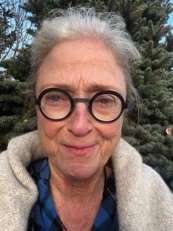+
Susan Jean Mayer
Theorizing the aims and character of distinctively democratic classrooom practices based upon
the philosophy of pragmatism and contemporary understandings of learning and development
BACKGROUND
I am a developmental learning and democratic curricular theorist who studies and writes about distinctively democratic classroom practices and the study of learning within schools.
As a developmental learning theorist, I draw on contemporary biopsychosocial understandings of learning and on the tools of classroom discourse analysis to inform my study of intellectual vibrancy in classrooms.
As a democratic curricular theorist, I proceed from basic democratic principles and commitments, drawing on the philosophy of pragmatism as introduced by William James and further explicated by John Dewey.

The questions I have pursued in my scholarship about what I have come to call classroom knowledge construction processes first arose when I was in high school myself. Basically, they involve the tension between the need for teachers to pass along valued cultural resources, as they understand these, and the need for students to learn to think for themselves and to make those resources—and others they encounter in their lives beyond school—their own.
As developmental learning researchers have by now more than amply demonstrated, young people can only authentically integrate unfamiliar perspectives and understandings when their minds are actively engaged. All students therefore need to be provided with opportunities to think in their own terms, even when these feel unfamiliar to their teachers, and to entertain the questions and connections that arise for them.
And as philosophers of pragmatism have long and convincingly argued, democracy both demands and enables a distinctive quality of intellectual freedom, one rooted in democratic values and in the principled, transparent, and collaborative construction of shared understandings. All democratic educators should therefore strive to enact these types of knowledge construction processes within their classrooms and to teach their students to value what such processes enable and to grow comfortable with their challenges.
I have taught teacher research and educational psychology in teacher education programs at Brandeis and Northeastern Universities and, early in my career, worked in textbook publishing. In both cases my experiences with the world of practice as currently constructed eventually drove me into periods of further study and writing.
I am in such a period now: my present efforts center on our urgent need as educators to expand awareness regarding the harmful forms of misdirection plaguing public school policy. Overwhelmingly, these can be traced to a determination among politicians at the state and federal levels to regulate and control from a distance what necessarily remains profoundly situated and relational work.
The therapeutic relation, also designed to promote human growth and learning, provides useful perspective on today's unholy preoccupation with mandated testing protocols and their outcomes. It would be as if the state rated and regulated therapists based on a pen and paper test their clients took upon the completion of a specified length of engagement.
Which is not to say that, in the case of schools, these tests and numbers have no relevance. When evaluating something as complex and multifaceted as a democratic school and the quality of human relation, learning, and growth fostered therein, though, numbers have to be interpreted with care and augmented with other more richly descriptive measures.
In this fight and others, I have drawn support from working with close colleagues, including my past co-editors at the Journal of the American Association for the Advancement of Curriculum Studies and those with whom I organized and operate Critical Exploration Press.
